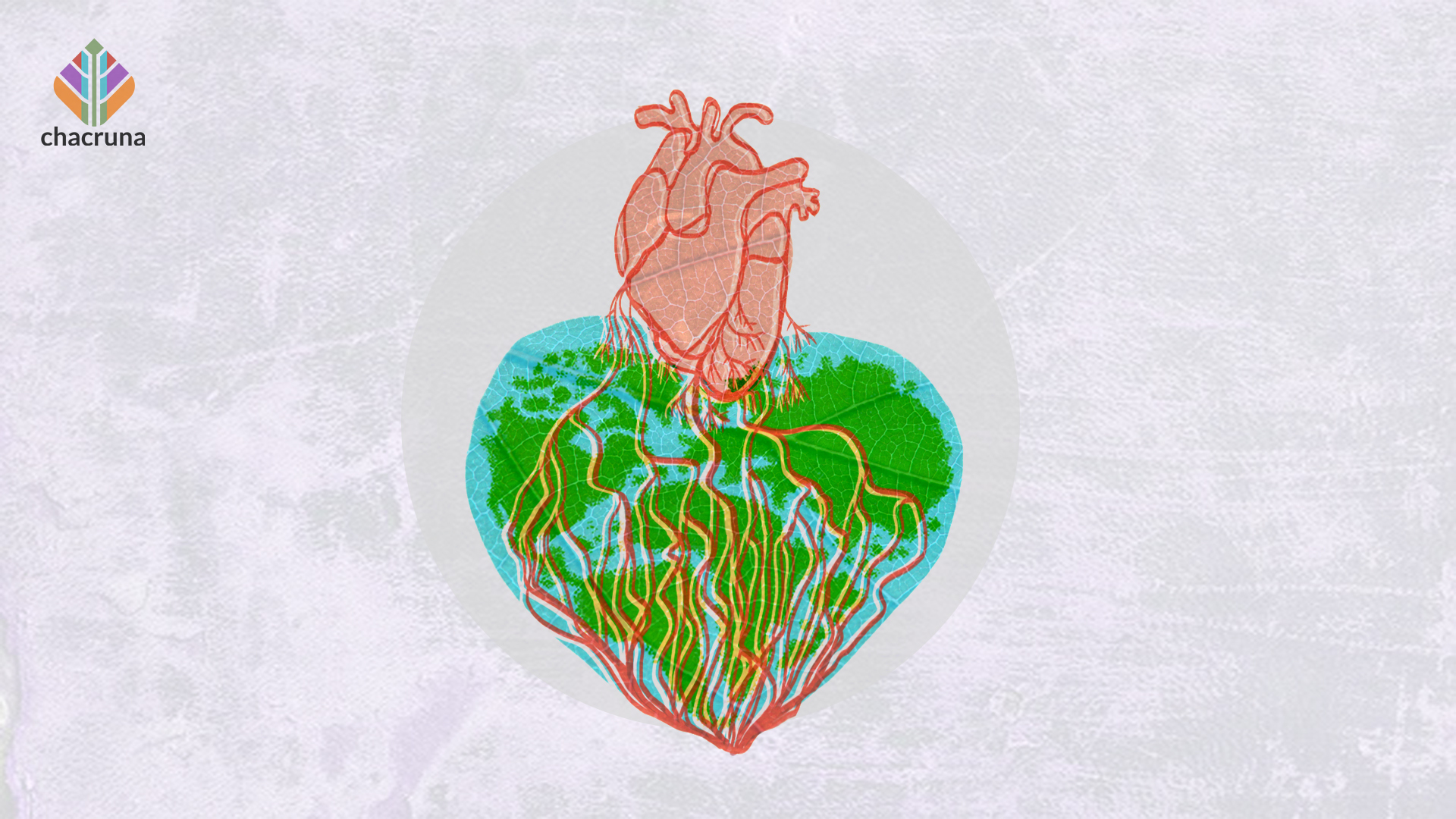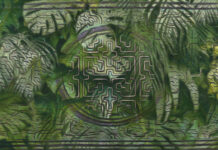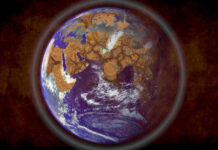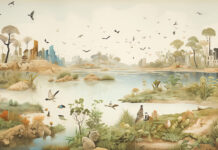- Ayahuasca, Healing and Cognitive Justice - December 3, 2020
- How Indigenous Youths in Peru are Being Initiated in Western Ayahuasca Retreat Centers - April 15, 2017
This article is the first on a series titled “The Epistemics of Ayahuasca,” mapping the complex and convoluted relationship between ayahuasca, sense-making, and knowledge. As the “crisis of meaning” in late-capitalist civilization spirals out of control, Indigenous psycho-spiritual technologies may offer promise—and pose risks—to our ability to make better sense of an increasingly complex world.
Epistemologies of the South
Why does one write, if not to put one’s pieces together?
From the moment we enter school or church, education chops us into pieces: it teaches us to divorce soul from body and mind from heart.
The fishermen of the Colombian coast must be learned doctors of ethics and morality, for they invented the word sentipensante, feeling-thinking, to define language that speaks the truth.
— Eduardo Galeano, (1989)
“Feeling-thinking” (Sentipensamiento in the Spanish original) is a term collected from the popular wisdom of the fishing communities of the Colombian Caribbean coast by the sociologist Orlando Fals Borda and popularized by the Uruguayan writer Eduardo Galeano, among others.
To “feel-think” is to think with the heart. It is an embodied, emotionally-informed, intuitive, and rational holistic cognitive process that stands in stark contrast with the disembodied, abstract, and cold detachment of Cartesian rationalism, the modality of thought that has prevailed in the West since the Enlightenment. The notion of a “feeling-thinking” epistemology has been further developed and expanded upon by Colombian anthropologist Arturo Escobar in his description of Sentipensar con la tierra, “feeling-thinking with the earth.” Escobar, drawing insights from the worlds of native Amazonian and other South American groups, illuminates another layer in the local processes of holistic thought: a theory of knowledge and a way of thinking that transcends the mind and the individual body to include the rhythms and feelings of the body of the Earth. A way of being in the world that is fully informed by and responsive to a sentient, communicative, and intentional living landscape.
At the core of the Epistemologies of the South is the need to reframe the pressing challenges faced by the modern world—ecological devastation, social inequality, cognitive injustice—from a radically different variety of perspectives
Arturo Escobar is an influential thinker within a framework that has gained a lot of traction in the Latin American social sciences. This framework is known as Epistemologias del Sur, or Epistemologies of the South, as proposed by the Portuguese sociologist Boaventura da Sousa Santos. At the core of the Epistemologies of the South is the need to reframe the pressing challenges faced by the modern world—ecological devastation, social inequality, cognitive injustice—from a radically different variety of perspectives, in light of the continued failure of the dominant streams within Eurocentric academy, politics—and their related assumptions about the nature of knowledge—to do so.
This framework aims to bring to the forefront of academic debate and political and social engagement the pluriverse, the vast variety and diversity of worlds and lived realities that constitute the life experiences of people in the “Global South,” together with their systems of knowledge. These are systems of knowledge and ways of being in the world that have been largely suppressed by the dominant logics of neoliberal capitalism, extractivism, colonialism, rugged individualism, or philosophical materialism—some of the components that form the ideological corpus of the “Global North”—and its universalist aspirations.
In short, these authors argue for the existential importance of giving visibility to the fact that the understanding of the world is much broader than the WEIRD (Western, Educated, Industrialized, Rich, Democratic) understanding of the world, and that solutions to modern problems might not be found exclusively within the confines of Western—or WEIRD, the increasingly popular acronym suggested by Joseph Henrich—epistemologies. Furthermore, it is the realization that potential solutions are already abundant: It isn’t only about imagining new ones, but about listening to the voices of the people who still remember how to live in harmony and balance with each other and the Earth.
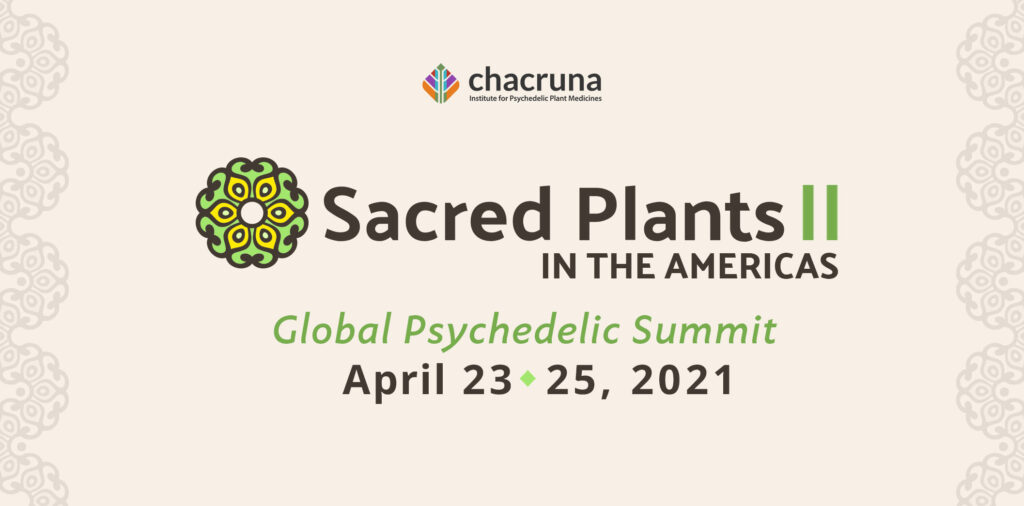
Join us at Sacred Plants in the Americas II
‘‘There is no Global Social Justice without Global Cognitive Justice’’
One of the most relevant aspects of this framework is the acknowledgement of the immense damage that has resulted from the systematic suppression of Indigenous (and other non-hegemonic) systems of knowledge over the past centuries and, in some cases, their systematic destruction. This is a process that da Sousa Santos terms “epistemicide,” and identifies it as a cognitive injustice: an unjustified lack of “equity between different ways of knowing and different forms of knowledge.”
As advocates for Amazonian plant medicine, we should be extremely aware of the importance of engaging earnestly with systems of knowledge that, despite centuries of colonial suppression, have nonetheless resisted and survived. Like the plant medicine community, the goal of the Epistemologies of the South is the creation of an “ecology of knowledges”: a horizontal dialogue where all knowledges are considered and valued, particularly around issues where Indigenous perspectives and experience are vastly more useful, in practical terms, than the ones that are produced in Eurocentric circles.
As an example, Arturo Escobar proposes that most of the resistance movements that have actually succeeded in stopping—or at least significantly challenging—the bottom-line-driven agendas of extractive industries have all originated from, and been led by, Indigenous peoples. He argues that, in terms of social transformation and self-emancipation, the knowledge originated by the territorial struggles of populations who are at the frontlines of ecological devastation is much more useful, appropriate, and sophisticated than other forms of knowledge, since it originates from the lived experience of people who are fighting for basic human rights, and imminently and immediately confronted with the interrelated crises of climate, food, energy, poverty, and meaning.
At an even more fundamental level, it is knowledge that is produced by people who are generally better at feeling-thinking with the earth than most people raised in urban environments. Communities who, for the most part, still make decisions that are informed by different sets of values and a more holistic cosmology, one that prioritizes the wellbeing of the community of the human and non-human people that inhabit the land, as well as the intrinsic value and rights of the natural landscape.
As the excesses of industrial civilization threaten the delicate balance of our planetary life-support systems, it seems that nothing is more important and urgent than to relearn how to live in relative harmony and reciprocity with our own selves, with others, and with the Earth as a whole. We stand at the edge of the precipice in relation to multiple existential risks, and we seem unable to generate the kind of knowledge that is needed to avoid catastrophe. In fact, says da Sousa Santos, nothing short of “a crucial epistemological transformation is required in order to reinvent social emancipation on a global scale.” But what could such a crucial transformation in the way that we perceive, construct, and gain knowledge about our world look like?
Reconnection
For the last four years, I have conducted doctoral fieldwork and led workshops at the Temple of the Way of Light, a well-known ayahuasca retreat center in the Peruvian Amazon. Besides my role facilitating retreats, I have conducted several dozen interviews that form the backbones of a few interesting qualitative studies; some in collaboration with ICEERS and the Beckley Foundation, and another one with the Centre for Psychedelic Research at Imperial College. Other than the general common interest in describing the therapeutic value that ayahuasca—understood as part of a wider system of Amazonian medical practices and sociality—may hold for people suffering from anxiety, depression, trauma or grief, my main personal interest is in the potential of these complex practices to shed light onto some of the fundamental structural problems at the root of these interrelated mental health crises, such as hyper-individualism, the erosion of communities and extended families, rampant consumerism or the meaning crisis, and the correlated human experiences of loneliness, social alienation, existential anxiety, and despair.
In a general sense, the interviews reveal a pretty compelling and coherent mythopoetic meta-narrative: a journey from disconnection to connection, from separateness to togetherness, from alienation to belonging. For many of the people who attend workshops at the center, ayahuasca seems to be playing a big role in reconnection, which is expressed variously as experiences of reconnection with self, reconnection with the body, reconnection with the emotions, to others, to the land, to Spirit or to the Earth. When prompted to elaborate on what it means for them to reconnect with themselves and their bodies, the same imagery is often used: reconnecting the brain with the heart, reconnecting the mind with the feelings, reconnecting rational thought with emotions.
For other people, ayahuasca can also facilitate a reconnection of the thinking mind with the feeling heart and the organic, living Earth. With help from the right underlying narrative, it appears to increase empathy for others, human and non-human alike, and to inspire people to reconsider their relationships and connections with their families, communities, societies, and environments. It facilitates the remembrance of a preindustrial feeling-thinking-with-the-earth way of being in the world that emphasizes the importance of maintaining a healthy social ecology. I frame ayahuasca as an epistemic tool for better sense-making and a relational medicine that reroutes disconnected individuals towards a an onto-epistemic re-enchantment and a remembrance of interdependence, a subject that I have spoken about abundantly in the past.
Humans, animals, trees, plants, storms, winds, and rivers all experience emotions, hold grudges, extend favors, and exert punishments. It is an enchanted world of sentience held in precarious balance by strict rules of reciprocity among spiritual equals.
Amazonian cosmologies are inherently relational; forest people inhabit worlds where relationships and connections are primary and fundamental, encompassing relationships between human people, and also non-human people. Accordingly, the understanding of health and wellbeing is fundamentally relational; in the jungle, disease and illness never happen in a vacuum. Physical, mental, and spiritual sickness is mediated by principles of reciprocity between intentional beings. Humans, animals, trees, plants, storms, winds, and rivers all experience emotions, hold grudges, extend favors, and exert punishments. It is an enchanted world of sentience held in precarious balance by strict rules of reciprocity among spiritual equals.
These relational cosmologies are fully reflected in the ayahuasca practices of Amazonian cultures and their emphasis on nurturing and strengthening in-group relationships on one hand, and the ubiquity of brujería, or sorcery on the other. As an example, North American anthropologist Janet Siskind noted more than 40 years ago that a substantial percentage of the adult male population of a Sharanahua community in the Peruvian Amazon drank ayahuasca twice a week. They did so, she observed, in order to become of “one heart” and to better share resources and cooperate with each other (1973).
Mediated by ayahuasca, many people have their “Eureka!” moment when they manage to transcend, even for a moment, the pervasive self-centered narratives and begin to reframe their healing process as a relational process.
This approach is radically different than the hyper-individualistic framework of Western medical cultures. This is true not also of the hegemonic medical establishment, but also of the heavily-medicalized “psychedelic renaissance” and many of the popular alternative medicines that draw heavily from New Age spiritualities and their emphasis on individual healing and personal “inner work.” While the vital importance of maintaining healthy and reciprocal relationships with other people and the natural world is implicit in feeling-thinking collectives, for individualistic Westerners, the relationships between environmental, cultural, social, and individual health are often obfuscated by an excessive focus on the self. Mediated by ayahuasca, many people have their “Eureka!” moment when they manage to transcend, even for a moment, the pervasive self-centered narratives and begin to reframe their healing process as a relational process.
When it comes to healing—becoming whole—these epistemic shifts are in a category of their own. Even if for a fleeting moment, people are able to experience themselves and the world in a holistic, interconnected way that feels novel, yet familiar. It elicits a remembrance of a feeling-thinking, embodied, and interdependent cognitive process that is the birthright of all human beings on this planet. This is something that Indigenous cultures have been trying to show us and to help us remember for centuries. So, how do we integrate such an epistemic and cognitive “archaic revival” within the limits of our current systems of knowledge?
Sign up for our newsletter
Steps Towards an Ecology of Knowledge
As an ayahuasca researcher, I feel that it is necessary to look for inspiration for our work within frameworks and schools of thought that are not only more diverse than the ones that dominate WEIRD theory, but also incredibly relevant. These are some of the reasons why gatherings that incorporate a wide range of perspectives and epistemological frameworks—active attempts to advance such an “ecology of knowledge”—are so important. Conferences such as Plantas Sagradas de las Americas, organized by Bia Labate and the Chacruna Institute for Psychedelic Plant Medicines (and the upcoming, virtual second edition of the gathering). are increasingly “sharing voice” with Indigenous experts and Latin American researchers in a field that is largely dominated by Euro-American voices.
If we are striving for better sense-making and a better understanding of the pluriverse we inhabit, Indigenous forms of knowledge must be fundamental aspects of our ecology of knowledge.
As we continue to unravel the therapeutic mechanisms of these inherently mysterious experiences, it is important to acknowledge that medicalization and Western epistemologies have their limits. As stated by da Sousa Santos, the epistemic diversity of the world is infinite, and no general theory can hope to understand it. If we are striving for better sense-making and a better understanding of the pluriverse we inhabit, Indigenous forms of knowledge must be fundamental aspects of our ecology of knowledge. Furthermore, on critical issues related to sovereignty, territorial struggles, resource management, and ethnobotany, local knowledge systems have a clear advantage in informing and describing the various practices and phenomena involved. It is knowledge that is generated not by the extractive logics of the neoliberal corporatocracy, but by people and communities who feel-think-with-the-earth.
In the closing chapters of her latest book, No is Not Enough: Defeating the New Shock Politics, Canadian author and social activist Naomi Klein addresses one of the basic premises of the Epistemologies of the South: What we are lacking in order to face pressing challenges is not alternatives, but alternative thinking of alternatives, including the remembrance of a pre-industrial epistemological lens.
“It is this imaginative capacity,” she writes,
the ability to envision a world radically different from the present, that has largely been missing… There are specific cultures and communities—most notably Indigenous communities—that have vigilantly kept alive memories and models of other ways to live, not based on ownership of the land and endless extraction of profit. But most of us who are outside those traditions find ourselves fully within capitalism’s matrix—so, while we can demand slight improvements to our current conditions, imagining something else entirely is distinctly more difficult. (2017, p. 220)
Indigenous people and their psycho-spiritual technologies could be powerful allies in our imperative quest to clear the layers of hardened bark from our feeling hearts and sprout the dormant tendrils and vines that connect us with the rest of our vast, sentient, intelligent, communicative, and intentional world.
Much can be said about a certain thread of messianic delusion running across some sectors of the Western plant medicine scene. As preposterous of a proposition that “ayahuasca will save the world” is, it does contain a kernel of warranted hope. It isn’t, however, about ayahuasca, but about whole systems of knowledge and the ways of being in the world that people who work with ayahuasca might be exposed to. At the very least, Indigenous people and their psycho-spiritual technologies could be powerful allies in our imperative quest to clear the layers of hardened bark from our feeling hearts and sprout the dormant tendrils and vines that connect us with the rest of our vast, sentient, intelligent, communicative, and intentional world. As a teacher from another tradition, and of another plant, once told me, “for you urban beings, the main value of these medicinal plants is to alphabetize you about nature.”
And, as LaDonna Brave Bull Allard, a powerful Lakota elder told Naomi Klein at Standing Rock, this is precisely the incredibly important role that Indigenous people and Indigenous systems of knowledge are playing in these difficult times: “To help humanity answer its most pressing question: How do we live with the Earth again, not against it?” (2017, p. 225)
As ayahuasca researchers, social activists, and justice-oriented human beings, sharing voice with Indigenous people can’t be reduced to a mere token of opportunistic appreciation for their wealth of resources and medical and spiritual systems. If we want to truly understand both the dangers and opportunities that lie ahead, their voices are not only important, but essential.
Note: This article is an updated version of an article previously published in Drogas, Política y Cultura.
Art by Mariom Luna.
References
De Sousa Santos, B. (2011). Epistemologias del Sur [Epistomologies of the South]. Utopía y Praxis Latinoamericana, 16(54), 17–39
Escobar, A. (2014). Sentipensar con la tierra: Nuevas lecturas sobre desarrollo, territorio y diferencia [Feeling with the Earth: New readings on development, territory and difference]. Medellín, Colombia: UNAULA
Escobar, A. (2016). Sentipensar con la Tierra: Las Luchas Territoriales y la Dimensión Ontológica de las Epistemologías del Sur [Feeling with the Earth: Territorial struggles and the ontological dimension of Southern Epistemologies]. Revista de Antropología Iberoamericana, 11(1), 11–32.
Fals Borda, O. (2009). 1925–2008. Una sociología sentipensante para América Latina [Thinking-feeling sociology for Latin America 1925–2008]. Bogotá: Siglo del Hombre Editores y CLACSO. pp.492.
Galeano, E. (1989) El libro de los abrazos [The book of embraces]. Madrid: Siglo Veintiuno de España Editores S.A.
Klein, N. (2017) No is not enough: Defeating the new shock politics. London: Allen Lane.
Siskind, J. (1973). Visions and cures among the Sharanahua. In M.J. Harner (Ed.), Hallucinogens and shamanism (pp. 28–39). New York City, NY: Oxford University Press
Take a minute to browse our stock:
Did you enjoy reading this article?
Please support Chacruna's work by donating to us. We are an independent organization and we offer free education and advocacy for psychedelic plant medicines. We are a team of dedicated volunteers!
Can you help Chacruna advance cultural understanding around these substances?










